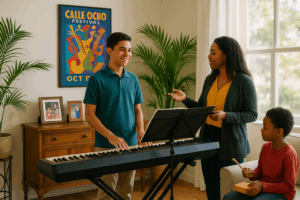Auditions can be nerve-wracking—but with focused preparation, Miami-based students can walk in feeling confident and walk out proud. Here are six effective strategies for rocking an audition successfully, especially for beginners or students auditioning for the first time.
1. Clarify Expectations Ahead of Time
Start by learning exactly what the audition requires. Will there be sight-reading? Is memorization expected? Will an accompanist be present? Understanding what’s ahead lets you focus your practice on the right skills. If you’re unsure, your private teacher can help you break it down so nothing catches you off guard.
2. Choose Repertoire That Reflects Your Strengths
Select a piece you feel confident with—even if it’s simple. Playing something cleanly and expressively will impress far more than struggling through a more difficult piece. To develop this skill, our guide to reading chord charts offers practical ways to help students select and interpret music that matches their current level while still demonstrating personality.
3. Practice in Different Spaces
Don’t just rehearse in your usual practice spot. Try performing in the living room, on FaceTime with a friend, or for your dog. Simulating different performance conditions will reduce nerves. The National Association for Music Education recommends rehearsing in front of others to build confidence and train performance focus.
4. Warm Up Mind and Body
On audition day, prepare with light scales, breathing exercises, and mental focus. Visualization can be surprisingly powerful—imagine walking in confidently, playing through your piece, and handling any surprises with grace. These habits help reset nerves and reframe them as energy.
5. Present Yourself with Poise
How you walk in, greet the judges, and carry yourself matters. Smile, breathe, and introduce yourself clearly. Stand or sit tall with good posture and begin when ready. This kind of presence reinforces your professionalism—and tells the panel you take the opportunity seriously.
6. Reflect and Regroup Afterward
No matter how the audition goes, take a few minutes afterward to reflect: What went well? What felt shaky? A good debrief turns each audition into a learning experience. For many students, it’s their second or third audition where confidence really takes off.
FAQ – Music Auditions for Beginners
Q: Is it better to memorize your audition piece?
A: Only if the audition requires it. Confidence and accuracy matter more than memory alone.
Q: What’s the best way to simulate an audition?
A: Set a timer, perform for someone else, and follow the audition order. No stopping or restarting.
Q: Can a student audition too early in their training?
A: Not necessarily. With the right piece and a positive mindset, even beginners can grow from the experience.
